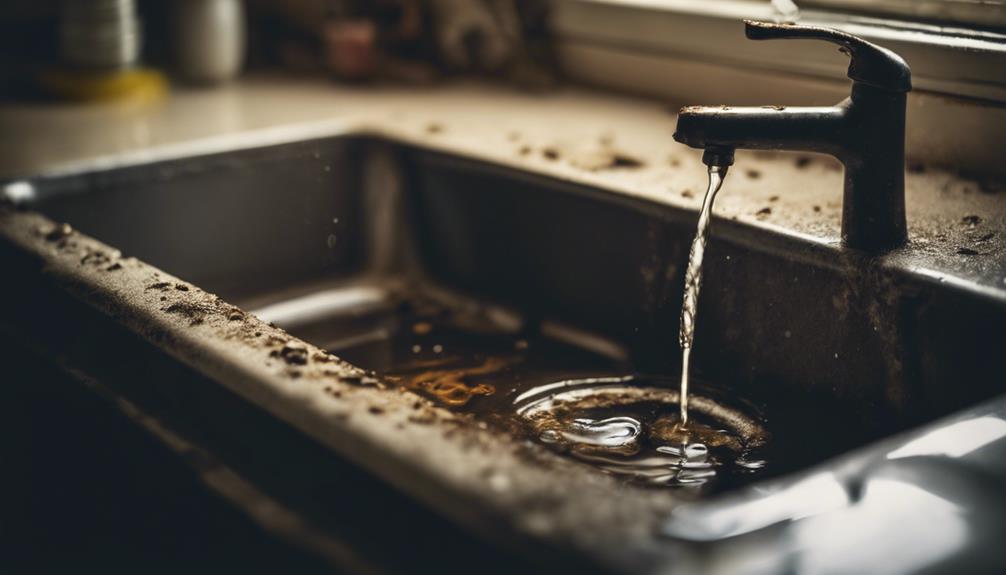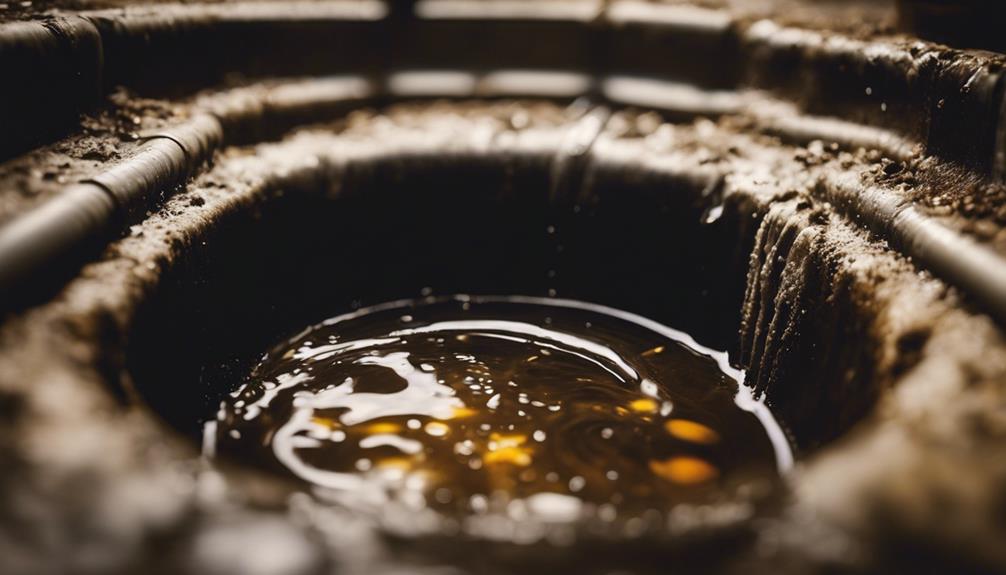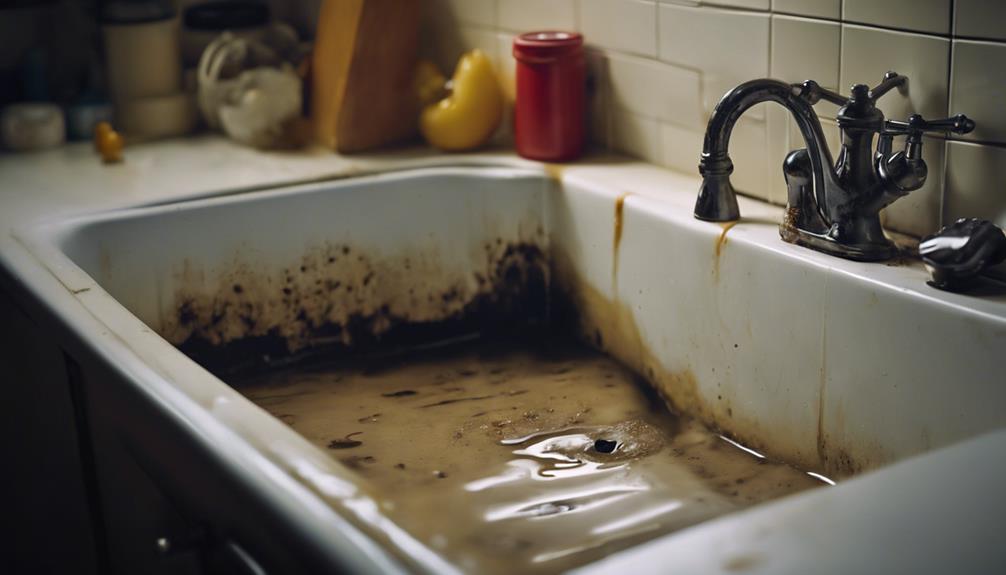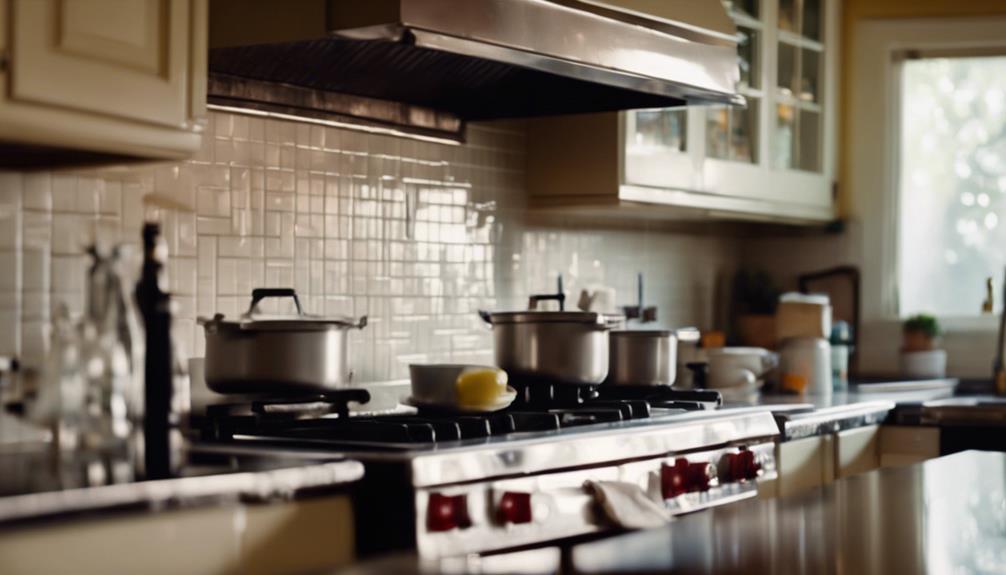Proper kitchen grease removal is vital for preventing blockages and costly repairs in your plumbing. Neglecting this maintenance can lead to clogged pipes, equipment damage, and expensive emergencies. By disposing of grease responsibly, you also help protect the environment and avoid fines for non-compliance. Keeping up with regular grease trap cleaning guarantees continuous wastewater flow, prevents disruptions, and upholds hygiene standards. Maintaining a clean and safe kitchen environment involves prioritizing grease removal. Understanding the importance of grease traps can save you from potential hazards and keep your kitchen running smoothly.
Key Takeaways
- Prevents blockages in sewer lines, avoiding costly repairs.
- Ensures compliance with health regulations and avoids fines.
- Protects the environment by preventing pollution and habitat damage.
- Maintains continuous wastewater flow for operational efficiency.
- Reduces health hazards, fatberg formation, and equipment damage.
Grease Traps in Sewer Lines
If you want to prevent sewer line blockages and backups, understanding the role of grease traps is important.
Grease traps play a key role in FOG management by intercepting fats, oils, and greases from wastewater in commercial kitchens. These traps help prevent blockages in sewer lines by slowing down the flow of wastewater and separating FOG for proper disposal.
Proper maintenance of grease traps is essential to make sure they function effectively, preventing costly repairs, environmental damage, and the formation of fatbergs in municipal sewage systems. Cleaning frequency for grease traps should be in accordance with local regulations and based on factors like trap size to maintain efficient operation.
Responsible disposal of FOG from grease traps isn't only necessary to prevent blockages and backups but also to comply with environmental protection and legal regulations. By adhering to these guidelines, you can help protect sewer lines and prevent environmental harm.
Costly Repairs Avoidance
To prevent costly repairs in your kitchen, guaranteeing proper grease removal is essential. Neglecting regular maintenance can lead to expensive plumbing emergencies caused by clogged pipes and drainage issues from grease buildup. This not only results in downtime but also increases the risk of equipment damage, ultimately leading to costly repairs or replacements. Investing in routine grease removal services is a more cost-effective approach compared to dealing with the aftermath of neglected maintenance.
Moreover, by prioritizing proper grease removal, you can avoid incurring costly fines and legal penalties associated with non-compliance with health and safety regulations. By staying proactive and staying on top of grease removal, you not only protect your kitchen equipment and plumbing but also ensure that you're meeting regulatory standards. Remember, prevention through regular maintenance is key to avoiding the financial and operational setbacks that come with neglecting grease removal in your kitchen.
Environmental Impact Prevention

Proper grease removal in your kitchen plays an essential role in preventing environmental harm and safeguarding ecosystems. When grease isn't disposed of properly, it can lead to a variety of environmental issues. Grease buildup has the potential to contaminate soil, affecting plant life and the overall health of the ecosystem. Improper disposal of grease can also result in air pollution and contribute to greenhouse gas emissions, exacerbating climate change. By guaranteeing that grease is disposed of correctly, you can help reduce environmental pollution and preserve natural habitats.
Effective grease removal practices are vital in preventing harmful chemicals from entering water sources and ecosystems. By taking the necessary steps to manage grease buildup and ensure proper disposal, you aren't only protecting wildlife but also promoting a healthier planet for future generations. Remember, every small action you take in your kitchen can have a positive impact on the environment, so make sure to prioritize responsible grease removal.
FOG Interception Importance
Ensuring proper grease removal in your kitchen isn't just about environmental impact prevention; it also includes the critical aspect of FOG interception importance. FOG, which stands for fats, oils, and greases, can wreak havoc on the municipal sewer system if not intercepted by grease traps.
By regularly maintaining these traps, you can prevent FOG from entering the sewer lines, reducing the likelihood of sewer backups and the associated costly repairs. Additionally, proper FOG removal isn't only about cost reduction but also about compliance with local regulations. Adhering to these regulations on FOG disposal is crucial for the grease traps to function effectively in commercial kitchens.
Ultimately, by prioritizing FOG interception, you aren't only protecting the environment but also ensuring the proper functioning of your kitchen's grease traps in accordance with the law.
Fatberg Formation Avoidance

Avoid the costly consequences of fatberg formation in your kitchen by prioritizing regular grease removal and disposal. Proper grease trap cleaning is essential to prevent clogs and backups in your pipes.
Regular cleaning and maintenance of grease traps help in avoiding the buildup of fat, oil, and grease (FOG) that can lead to fatberg formation. Neglecting the importance of regular grease trap cleaning can result in clogged pipes, which not only pose health hazards but also lead to environmental damage.
Compliance With Regulations
You must adhere to health and safety regulations regarding grease removal to avoid fines and legal repercussions.
Failure to follow these guidelines can lead to closure due to health violations caused by grease buildup.
It's important to prioritize compliance to maintain a safe and hygienic kitchen environment.
Regulatory Compliance Importance
Compliance with health and safety regulations mandates that regular grease trap cleaning be conducted to prevent clogs and backups. Failure to adhere to these regulations can lead to fines, health code violations, and disruptions in restaurant operations.
Proper cleaning and maintenance of grease traps are vital for avoiding backups that can result in costly consequences. Regulations outline specific cleaning frequencies based on the size and grease accumulation in traps to guarantee a hygienic environment.
Legal Consequences Reminder
Proper adherence to grease trap regulations is vital to avoid the legal consequences that can result from non-compliance. Failure to follow health regulations and maintain grease traps adequately can lead to fines, reputation damage, and loss of customer trust.
Neglecting these regulations may also pose environmental hazards, jeopardize public safety, and result in liability for damages. Non-compliance with grease trap regulations could even lead to the closure of the establishment.
It's essential to prioritize compliance with these regulations to prevent legal actions, financial penalties, and potential closure of your business. Remember, maintaining proper grease management practices isn't just about cleanliness; it's about upholding the law and safeguarding your business's reputation and the well-being of your customers and the environment.
Clog Prevention Strategies

To prevent clogs in your kitchen drains, implementing effective grease trap maintenance and drain cleaning techniques is essential.
By regularly maintaining your grease trap and cleaning your drains, you can avoid costly plumbing issues and guarantee smooth water flow.
Taking proactive measures now can save you time and money by preventing blockages and potential disruptions in your kitchen operations.
Grease Trap Maintenance
Regular maintenance of your grease trap is crucial to prevent clogs and guarantee the smooth operation of your kitchen plumbing system. Keeping up with regular cleaning helps prevent costly clogs, ensuring that wastewater flows smoothly and minimizing operational disruptions.
It's essential for compliance with health and safety regulations in commercial kitchens. Proper grease trap maintenance also reduces the risk of expensive repairs, minimizing kitchen downtime. By managing your grease trap effectively, you contribute to a safer environment for both your staff and customers.
Drain Cleaning Techniques
Implementing effective drain cleaning techniques is essential for preventing clogs and maintaining the smooth operation of your kitchen plumbing system. Regular drain cleaning helps prevent backups, foul odors from trapped grease, and costly repairs.
Proper maintenance ensures a continuous flow of wastewater by removing FOG buildup that can lead to operational disruptions. These strategies are particularly important for commercial kitchens to comply with health and safety regulations.
Backups and Fines Prevention
Preventing backups and avoiding fines hinges on the proper removal of kitchen grease. In commercial kitchens, grease traps play an essential role in trapping grease and preventing it from entering the sewer system. Regular trap cleaning is vital to guarantee proper functioning and prevent clogs that can lead to backups.
Failure to comply with local regulations regarding grease removal can result in fines due to health compliance issues. These fines not only impact the financial aspect but also indicate a lack of environmental responsibility.
Grease buildup in kitchen pipes not only causes unpleasant odors but also creates unsanitary conditions that can affect the overall hygiene of the kitchen. By prioritizing proper grease removal, you not only prevent backups and fines but also contribute to a cleaner and safer environment for both your kitchen staff and the community.
Cleaner and Safer Environment

Creating a cleaner and safer environment in your kitchen starts with proper grease removal. Grease traps play a vital role in this process by capturing grease and food particles, preventing clogs in your plumbing system. Regular trap cleaning is essential to maintain a hygienic space and prevent foul odors. By adhering to proper cleaning practices, you not only guarantee compliance with health regulations but also avoid fines imposed by regulatory agencies.
Moreover, by implementing environmentally friendly practices such as grease disposal through approved methods, you contribute to a sustainable kitchen environment. Staff training on the importance of grease removal and maintenance is key to upholding cleanliness standards and preventing slip-and-fall hazards caused by greasy floors. Remember, a clean kitchen environment not only enhances staff productivity and morale but also deters pest infestations attracted to food residue. Prioritize regular maintenance of grease traps to create a workspace that's both clean and safe for all.
Conclusion
Now that you understand why proper kitchen grease removal is essential, remember that by taking proactive steps to prevent grease buildup, you aren't only avoiding costly repairs and environmental damage, but also contributing to a cleaner and safer environment for all.
Make sure to adhere to regulations, implement clog prevention strategies, and stay vigilant in maintaining a grease-free kitchen to keep your sewer lines clear and avoid potential fatberg formations.